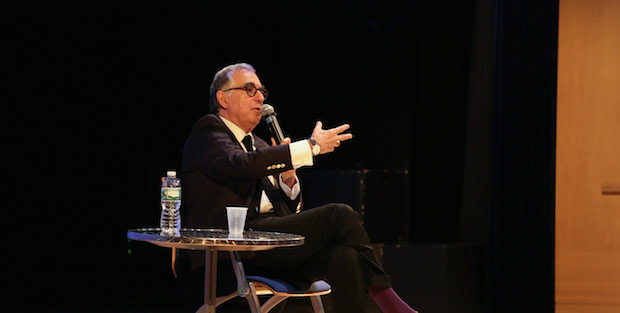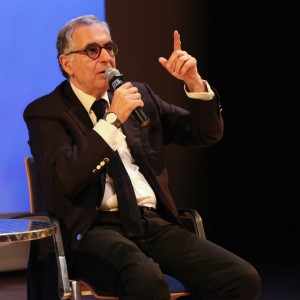Now that spring has arrived, it is time to speak of love, no? I am not certain that such was the intention of New York Times columnist David Brooks last week when he penned his wonderful article about a 1945 encounter between the British intellectual Isaiah Berlin and the Russian poet Anna Akhmatova, but it is the motivation behind my post today. To raise the subject of love, that love of literature and life which so imbues students and teachers alike at the Lycée Français de New York.
As Brooks explains in his exquisitely evocative piece, “Berlin was hanging out [in Leningrad] when a friend asked if he’d like to go visit Anna Akhmatova. Not knowing much about her, Berlin said yes.” Thus “Berlin was taken to her apartment and met a woman still beautiful and powerful, but wounded by tyranny and war. At first, their conversation was restrained…Visitors came and went. By midnight, they were alone, sitting on opposite ends of her room.”
“Humanity’s inherited storehouse”
And then their talk became more personal, with Akhmatova speaking of her life, reciting Byron and declaiming her own extraordinary poetry: “by 4 in the morning, they were talking about the greats. They agreed about Pushkin and Chekhov. Berlin liked the light intelligence of Turgenev, while Akhmatova preferred the dark intensity of Dostoyevsky. Deeper and deeper they talked, baring their souls.”
Sharing their experiences of life, whilst weaving into their conversation references to and passages from the literature which moved them, Akhmatova and Berlin engaged in a very special kind of communication, one which persisted through the following morning and led Berlin to exclaim “I am in love; I am in love” in part because this communication was between two people who both believed “that the knowledge most worth attending…is…found…in the great works of culture, in humanity’s inherited storehouse of moral, emotional and existential wisdom.”
Berlin and Akhmatova, affirms David Brooks, “could experience that sort of life-altering conversation because they had done the reading…They had the common language of literature, written by geniuses who understand us better than we understand ourselves…Their communion was primarily intellectual, emotional and spiritual, creating a combination of friendship and love…They shared and also augmented each other’s understanding.”
“Great Books/Big Ideas”
What connection, one might ask, to the Lycée Français? It is to Brooks’s concluding paragraph that I would also like to draw your attention. “I’m old enough to remember,” writes the journalist, “when many people committed themselves to this sort of life and dreamed of this sort of communion-the whole Great Books/Big Ideas thing. I am not sure how many people believe in or aspire to this sort of life today. I’m not sure how many schools prepare students for this kind of love.”
Author and 2012 LFNY Literary Prize Winner Metin Arditi on May 9, 2014, in the auditorium.
Well, ours does, as any member of the Lycée Français de New York can readily attest, with innumerable examples to illustrate his or her point. Our curriculum is renowned for the exceptional “culture générale” it provides our students, not to mention the genuine sense of purpose and I dare say love with which they and our outstanding literature faculty explore the world of books and the tales of the human adventure that literature contains.
The marvelous writer Metin Arditi
These were my thoughts on Friday morning, sitting in our auditorium and listening to the remarkable conference organized with and around the marvelous Swiss writer Metin Arditi, whose novel Le Turquetto received the 2012 LFNY Literary Prize from a selection committee composed of some twenty impassioned students, faculty, staff and parents. Rather than only have the 150 high school students in attendance ask Mr. Arditi questions, which they had the opportunity to do at the end of the event, the Chair of our French Department and founder of our literary award Isabelle Milkoff invited a tenth grader to introduce the prize-winning novel.
Our student fulfilled this responsibility with striking enthusiasm, the authenticity of which served to deepen the already profound appreciation for literature which everyone in the room clearly shared. Next came two eleventh grade students from our school translation club who read aloud the opening chapter of Le Turquetto, first in French and then in the English version which they and their fellow translators had crafted. Their text was hauntingly beautiful and all the more so because of their palpable complicity of imagination with the author listening right beside them. In my humble opinion, there is no doubt that Berlin and Akhmatova would have recognized their own emotions in those of our assembly, transported as we were by literature and loving the humanity of that experience.
About the Author :
Sean Lynch was Head of School at the Lycée Français de New York from 2011 to 2018, after having spent 15 years at another French bilingual school outside of Paris: the Lycée International de St. Germain-en-Laye. Holding both French and American nationalities, educated in France (Sciences Po Paris) and the United States (Yale), and as the proud husband of a French-American spouse and father of two French-American daughters, Sean Lynch has spent his entire professional and personal life at the junction between the languages, cultures and educational systems of France and the United States. In addition to being passionate about education, he loves everything related to the mountains, particularly the Parc National du Mercantour.


